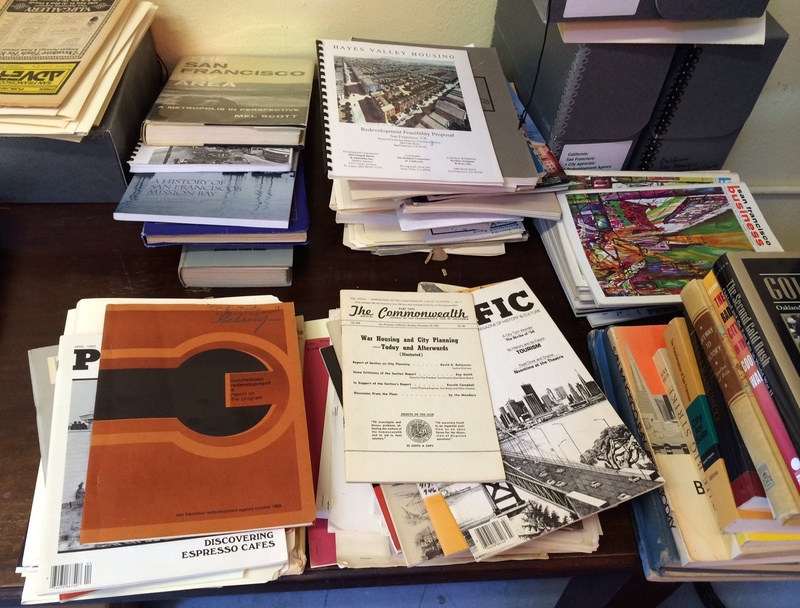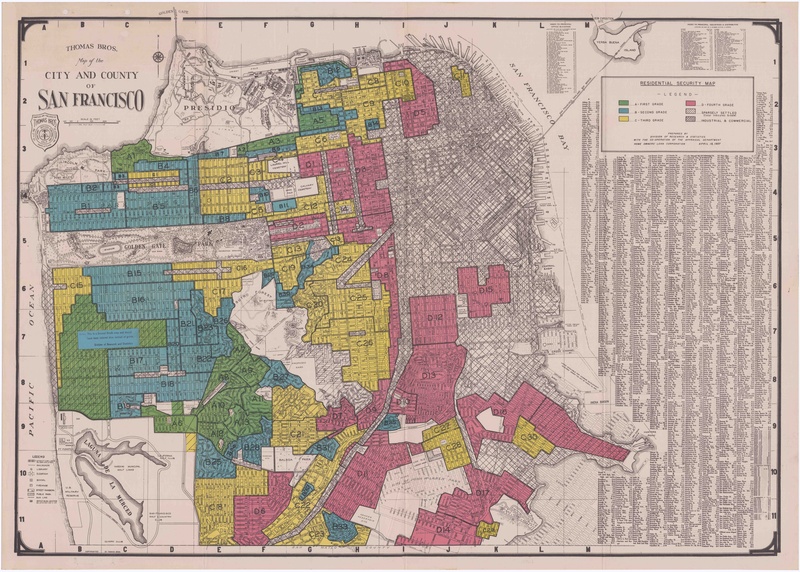San Francisco LocalWiki gentrification editathon
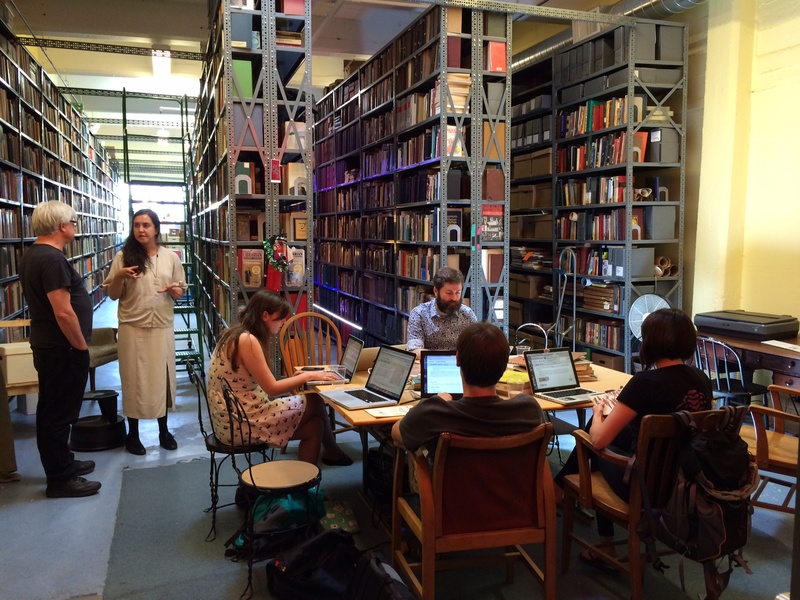 Several editors on Saturday afternoon at the Prelinger Library.
Several editors on Saturday afternoon at the Prelinger Library.
On Wednesday and Saturday of last week, contributors to the San Francisco LocalWiki held an editathon focusing on gentrification and displacement in SF:
Do you often wonder what historical precedents have contributed to the current housing crisis? How do World War II-era booms weave into current displacement trends? What can the housing overcrowding, racism and displacement of yesterday tell us about today’s realities?
I'd only occasionally edited LocalWiki before seeing this event announced on Twitter, but it was an interesting announcement—the idea of using this wiki to compile historical context for one of the city's most controversial and complicated issues. This topic would be overwhelming to dig into by myself, but with a few other editors around, you can share background knowledge, discuss ideas, and get immediate editing help and suggestions.
And we wrote a bunch of articles! Here's a little about what worked for this event and a list of what people edited, including suggestions for future editors interested in continuing this effort. I'd like to encourage other LocalWikis to run events tackling the hard issues in your cities too, and I'd like San Francisco LocalWiki to be used and improved by more people.
What was great about these events
Our host was the wonderful Prelinger Library, an "appropriation-friendly" library strong in San Francisco history, particularly land use, city planning and redevelopment, activism, and migrations. They pulled out piles of relevant materials for editors to use. You might guess a library of neat old books and rare magazines would be good for research, but it's even better for inspiration. Every editor gets the feeling of not knowing what to edit next, especially new editors—but here you could just pick up an original pamphlet on the displacement of residents in the Western Addition in the 1960s, and leaf through it to find good topics to tackle.
It helped that this editathon supported newcomers and didn't require people to bring computers. I came with a friend who hadn't edited LocalWiki or Wikipedia before (beyond tiny edits), and he felt more comfortable jumping into LocalWiki than Wikipedia because it has fewer rules and a smaller community. The editathon page was clear about the relaxed guidelines: all knowledge is valid on the wiki (that is, book knowledge and personal knowledge are both useful to share). The "what you see is what you get" editing interface (no odd code) is also nice for new editors. And coming together in person supports interesting discussions of what LocalWiki is for, and what its potential could be as a community knowledge commons.
San Francisco is lucky in that our neighbor Oakland has a very active LocalWiki crowd, and some of them came over to help—this whole editathon was organized by volunteers active on Oakland Wiki, as well as other people who live on both sides of the bay who have been interested in diving into the SF LocalWiki. (Oakland Wiki has an every-other-Thursday editing meetup at a hackerspace there, and a history of cool local history editing events in general.) For this editathon, Vicky, an Oakland Wiki volunteer working on outreach, emailed the local Wikipedia editors mailing list, which makes a lot of sense—I'm a good example of a long-time Wikipedia editor willing to try LocalWiki.
Estimating by looking at recent activity, the editathon had contributions from 14 logged-in editors (including 5 brand-new editors) and several anonymous editors. Logged-in editors included ArlenAbraham, britta, bsdfm, hans, eekiv (Vicky), h0mee (Praveen), jarios (Julio), leah, Leslie, Megan-library (one of our hosts), mk30 (Marina), PhilipNeustrom, substack, and Vida.
What we edited, and suggestions for how you can contribute
New articles
About patterns
San Francisco building boom (present) — explains a bit of the why, where, and effects. (This article could use more summary and more links to places to learn more.) Related new articles: 350 8th Street (new housing going up near the Prelinger Library), New Construction San Francisco (a blog), and Rats (who have become more of a menace lately as more of them are displaced due to the redevelopment boom).
Redlining and Redlining in San Francisco — the discriminatory practice of denying home/business loans based on neighborhoods of "undesirable" populations. (These articles could use a lot more information on the history of racialized housing discrimination.)
Reclaimed wood — a popular aesthetic choice for new high-end businesses, including MacBook Air Cafes. (Got photos to add?) Related expanded article: Cafes — includes a history of European-style espresso cafes becoming popular in San Francisco, including an early one in the Mission.
About government and redevelopment
San Francisco Redevelopment Agency — worked on many projects, including the Western Addition! (This article could use more information about redevelopment projects they worked on and what exactly they have done to contribute to population displacement and migrations.)
M. Justin Herman — the executive director of the SF Redevelopment Agency from 1959 to 1971. He drove large changes that displaced many people in several parts of the city, including the Fillmore and Japantown.
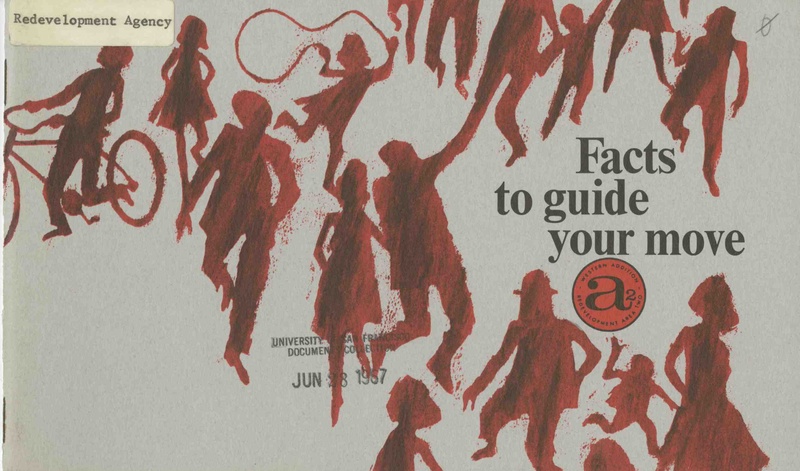 Redevelopment Agency booklet for Western Addition residents, scanned from the copy at the Prelinger Library.
Redevelopment Agency booklet for Western Addition residents, scanned from the copy at the Prelinger Library.India Basin — originally called Butchertown, an industrial area changed by the Redevelopment Agency without creating as many jobs as promised. Related new article: India Basin Neighborhood Association.
Yerba Buena Center for the Arts — an arts complex that was part of the 1970s redevelopment of SoMA. (This article could use more detail and some pictures.)
Urban Design Plan — part of the San Francisco Master Plan, adopted in 1972: "The preservationist and environmentalist tendencies of the report to temper and slow growth has likely contributed to the lack of affordable housing and levels of gentrification in San Francisco today." (This article could use some personal perspectives and links to what other people think of this plan.)
Proposition B (Waterfront Building Heights) — a June 2014 ballot measure restricting waterfront heights of buildings. (This article could use more detail.)
About organizations and companies
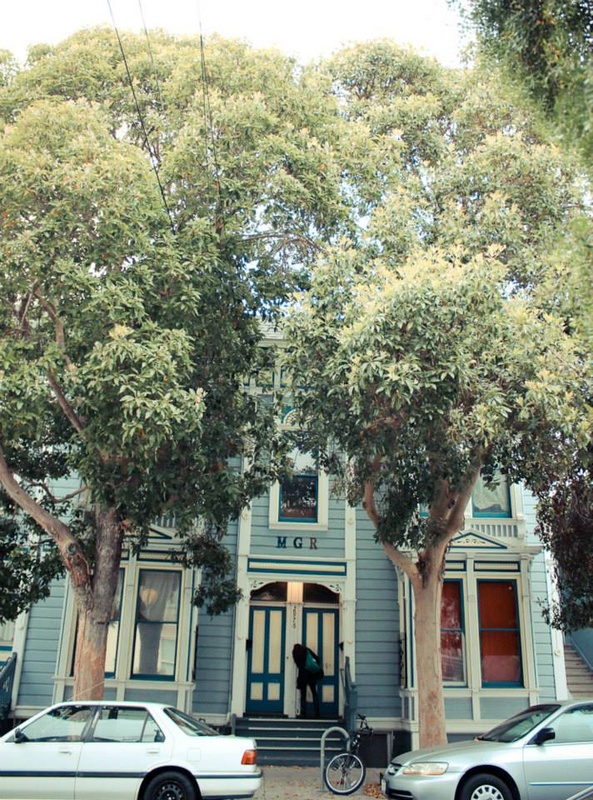 House at 2976 23rd Street that avoided eviction.
House at 2976 23rd Street that avoided eviction.The Law Offices of Bornstein and Bornstein — a controversial law firm that shows up in news about gentrification. (This article could use more links to news, as well as personal perspectives and experiences.)
Leways — a non-profit youth center in Chinatown that had an incident of police smashing in 1971. Related expanded article: Chinatown — includes some history of community organizations active in the 1960s-70s. (Both of these articles could need more detail about this history. Were you involved and would like to add something?)
Clean up the Plaza — a controversial effort to "improve" (or gentrify) the 16th Street Mission BART station and surrounding area. (This article could use a summary of the story so far, including a history of community activism against the project, and individual perspectives.)
San Francisco Business — a magazine published by the Chamber of Commerce, promoting the advantages of business in San Francisco. (This article could use more information.)
Homes Not Jails — an organization advocating "for the use of vacant and abandoned housing for people who are are homeless". (This article could use more information from people who are directly involved in Homes Not Jails.)
Expanded articles
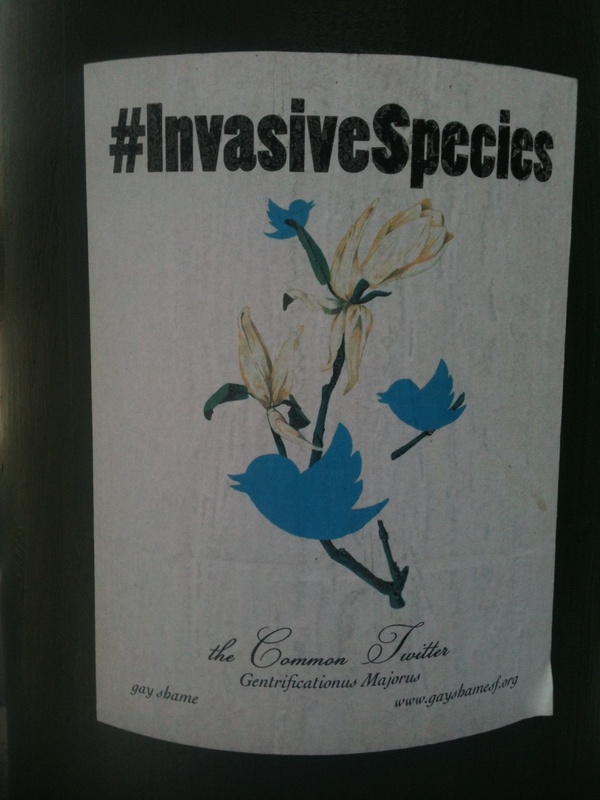 Anti-Twitter poster from 2014.
Anti-Twitter poster from 2014.Gentrification — has links to useful news articles (and could use some more!).
Old Mission Police Station — includes information about its post-station life as a dot-com company office in the late 90s.
Public Housing — includes links about San Francisco's housing projects starting in the 1930s and 40s.
So much more
You can also check out other gentrification-focused articles on this wiki! There are many more topics that would be important to cover for a thoughtful structural understanding of gentrification in San Francisco, and this editathon was an interesting and fun first push at improvement. For news about future events, follow LocalWiki on Twitter, or join the new SF LocalWiki email list. If you'd like to visit the Prelinger Library, it's open on Wednesdays from 1 to 8 pm.
Finally, if you'd like to get involved with LocalWiki in San Francisco, come by our next event: City Knowledge Share - a collaborative editing event at Code for America on Aug. 23rd focusing on city government and services.
This blog post was edited by Vicky Knox - thanks Vicky!

